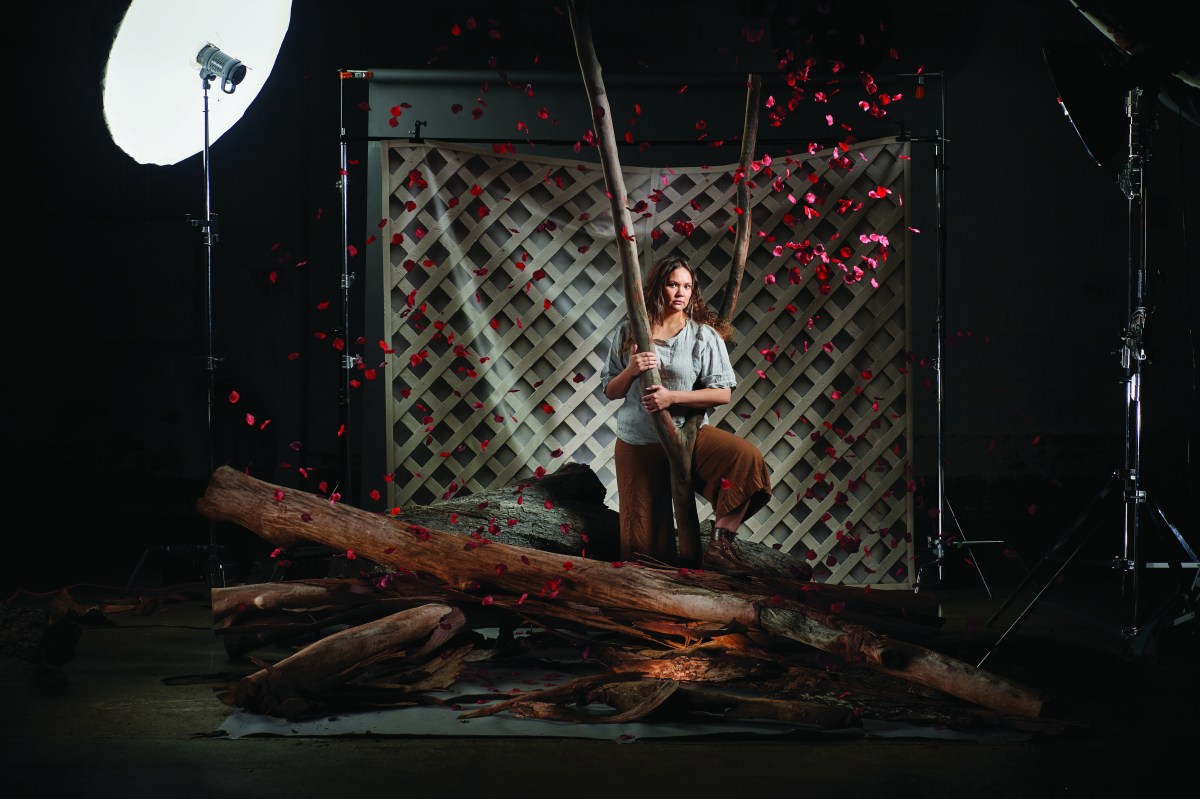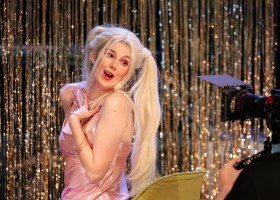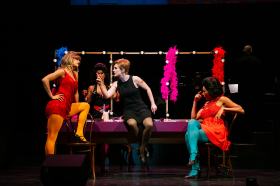A low hum rises to the startling crack of a gunshot. Three women – a mother and her daughters – spit vitriol at the lifeless body of their murdered abuser, whose corpse the audience cannot see. Even in death this ‘shit-stink-man’ remains a threat to the family’s freedom, as his incriminating cadaver lies exposed to prying eyes. A knock at the door sends the women into a panic, as a neighbour intrudes upon the grisly, morbid scene. Under the chequered shadow of an imposing lattice wall, the women must clean up their tormentor’s mess, one final time.
Nosy neighbours and a postal policeman show up at the home one after another, taking it upon themselves to find the missing man. The reactions elicited in these encounters are suspenseful, with each instance leading to (in the absence of overt spoilers) subversively-complicit conclusions.
Karla Hart, Ebony McGuire and Stephanie Somerville give raw performances as Mum, Ada and Ida, respectively. All three are impressive in emotional power and presence. Their flawless execution of Angus Cerini’s script flows with the figurative music of poetry, revealing rage as a forcefield against victimhood. Hart, McGuire and Somerville are the play’s only cast. The lines and actions of peripheral characters are described by the trio in realistic Australian language (‘This bloke, our father’) and poetic metered phrasing (‘Went to the pub, never came back…’). This purposeful framing reinforces the intentional centring of the protagonists’ perspectives.
The play’s language alternates between harrowing and playful (‘neck-juice spilling…’), often mimicking the real-life absurdity inherent to stressful situations. Despite the cast maintaining relentless intensity, humorous moments abound, strategically easing the dramatic tension. Barely a second of stage time escapes the benefit of Rachael Dease’s atmospheric sound design, which seamlessly integrates itself with the narrative. Her ominous and repetitive compositions create an underlying sense of dread, hitting the most unnerving notes in all the right ways.
A vast lattice backdrop shifts imperceptibly throughout the performance, expanding the stage with mechanical magic. Lattice – in addition to epitomising an Aussie backyard aesthetic – provides both the illusion of privacy and the possibility of being observed, heightening certain suspenseful elements of this gothic domestic thriller. Designed by Tyler Hill, the shifting set visually underlines how the death of the so-called patriarch has enabled the women’s world to expand, creating a new space in which life can finally bloom. Chloe Ogilvie’s understated lighting highlights the adaptability of the set with warmth, depth and strategic shadow.
Without giving too much away, The Bleeding Tree provides a clever subversion of a problematic social issue by reversing the roles of victim and aggressor, thereby perpetuating the culture of complicity that too often reinforces toxic cycles of violence. Humans can easily turn blind eyes to murder, if they feel the act itself is justifiable. However, for casual complicity to be a hook on which traumatised women’s freedom must hang is as ethically unsettling as it is ironically comforting. The Bleeding Tree pushes the audience to rejoice in acts of covert complicity, forcing viewers to question whether turning away from the truth is ever truly justifiable.
Read: Book review: Overland issue 249, edited by Evelyn Araluen and Jonathan Dunk
Co-presented by Black Swan Theatre Company and The Blue Room Theatre, this unforgettable murder ballad explores the tense relationships between violence, complicity, unity and resilience. Strong in its rawness and visual simplicity, The Bleeding Tree was first produced by Griffin Theatre Company in 2015. This particular iteration was originally supported and presented at The Blue Room Theatre in 2021. Directed by Ian Michael, it stars a talented WA First Nations cast, and is a memorably poetic, award-winning production.
The Bleeding Tree by Angus Cerini
A co-production of Black Swan Theatre Company and Blue Room Theatre, WA
Director: Ian Michael
Set and Costume Designer: Tyler Hill
Lighting Designer: Chloe Ogilvie
Composer and Sound Designer: Rachael Dease
Independent Producer: Melanie Julien-Martial
Voice Coach: Julia Moody
Stage Manager: Sophia Morgan
Mechanist: Ruben Dwyer
Tickets: $30-$75
The Bleeding Tree will be performed until 14 May 2023.






